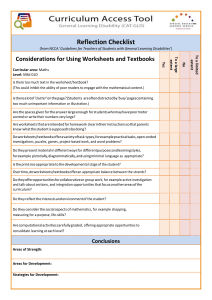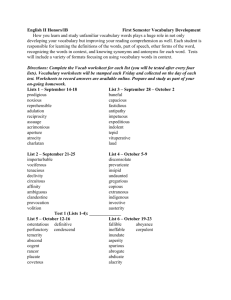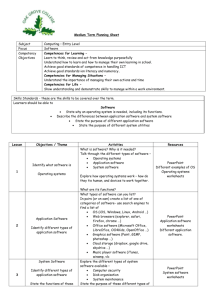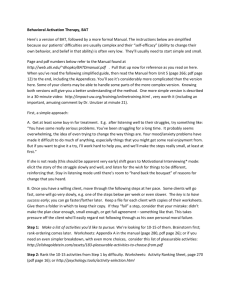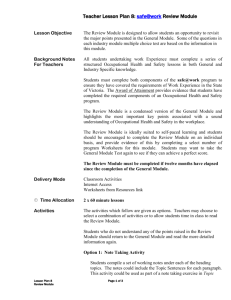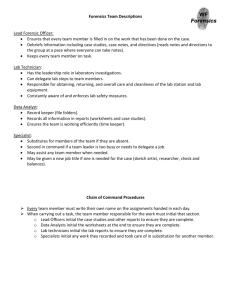No More Worksheets!! - For the Love of Literacy Conference
advertisement
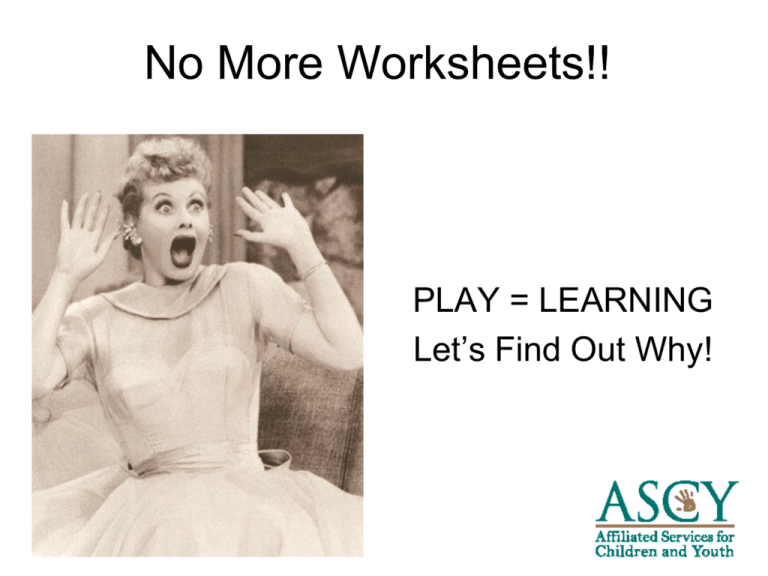
No More Worksheets!! PLAY = LEARNING Let’s Find Out Why! When you are learning to do something new, how do you like to learn? Here is our problem… According to one recent survey, 65% of parents believe that flash cards are “very effective” in helping 2-year-olds develop their intellectual capacity. So moms and dads drill their little ones with “Baby Webster” vocabulary cards, then take a break by popping in a “Baby Einstein” videotape. The irony is that 30 years of accumulated scientific knowledge have taught us that faster is not better. Yet the crisis continues as young children are pushed to achieve and produce in ways that are antithetical to how children learn best. The amount of time children spend in free play has been steadily decreasing since the 1980s. “Up the Ante” with Intelligent Play OR “Drill and Kill” By examining the evidence that scientists have collected on intellectual and social development, you will come to understand why PLAY = LEARNING The research tells us you can’t make children ready for school by treating them like 3rd graders. Early Learning for Every Child Today A framework for Ontario early childhood settings http://www.edu.gov.on.ca/childcare/oelf/ How to grow a smart kid? or This way? This way? Worksheets are not developmentally appropriate. Worksheets only tell you what the child knows. A snapshot of knowledge. What do worksheets take away from children? What are the missed opportunities? • • • • • • • • Oral language Creativity Movement Sensory experiences necessary for brain development Problem-solving moments Narrative skills Human interaction Friendships It’s okay to play! After decades of research, scientists have come to a clear conclusion: Play is the best way for our children to learn. Einstein May Never Have Used Flashcards, but he Probably Built Forts What Early Childhood Educators Know Play is little experiments to figure out what objects can and cannot do. Children need to figure out first-hand for themselves; there is only so much that can be learned by watching others. There are learning opportunities everywhere you look. Playful moments are really learning opportunities in disguise. Play is to early childhood what gas is to a car. It is the very fuel of every intellectual activity that our children engage in. Einstein Never Used Flash Cards pg.214 They use concrete rather than abstract symbols to represent objects and ideas! Worksheets are abstract! Remember me? Most pre-school and kindergarten children are in what Piaget described as the preoperational stage of cognitive development. Young children’s cognitive development occurs through interactions with physical objects. What is needed are the gritty, day-to-day experiences of exploring, manipulating, sorting, dividing, and recombining that children have as they play with objects. Oral language is the foundation for literacy How much talking accompanies worksheets? Children with strong oral language often have strong reading and writing skills. Play…. • • • • • • • • • • Is active engagement Is pleasurable Has no extrinsic goals Stems from the child’s desire Gives children a sense of power Allows children to invent Allows children to solve problems Is a vehicle for emotional development Provides opportunities to build vocabularies Allows children to master new skills Play is different at different ages Preschool children should not be expected to write on lined paper because in preschool the properties of drawing and writing are still intermingled. Movement makes memory and memory makes for learning Play deprivation can lead to depression and hostility in children? Frost, Neuroscience, Play and Child Development) A true sense of ‘‘interpersonal nuance’’ can be achieved only by a child who is engaging all five senses by playing in the three-dimensional world. Children who are prematurely pushed into regimented academic instruction display less creativity and enthusiasm for learning in later years. (Kathy Hirsh-Pasek, page 11) Children who learn through play develop social and emotional skills, which are critical for long-term success. Skills are unlikely to flourish in very young children when presented out of context as isolated skills. (NAEYC, 1995) Worksheets present isolated skills out of context. Now let’s decide… Which road should you take? WORKSHEETS PLAY Let’s compare…. Can you change these worksheets into play-based activities? Conclusions Stand up for the child’s right to play! Brain building requires play Timing is critical Preschool should not look like primary school. A play-based curriculum provides opportunities to learn about reading, writing and math through real, meaningful situations. First, adopt an attitude of conscious, deliberate planning in which play is regarded as one of the most important aspects of the children's environment. Second, see to it that children are provided with the kinds of toys and playthings that will help develop the widest possible varieties of skills and abilities. Our goal as educators should be lessons that encourage divergent thinking, not convergent thinking. Some children need help learning how to play. Tube play: how many ways can you use a cardboard tube? If we cannot demonstrate children’s progress with worksheets, how do we provide evidence of learning? • • • • • Work samples Portfolios Observation records Checklists Appropriate worksheets*** recording sink and float experiments • Parent newsletters • Centre labels describing what children learn in the various learning centres to help adults understand the value of the children’s work in that area • Photographs The worksheet cycle. Don’t let yourself fall victim to it. Common Misconceptions • If the kids are choosing the worksheets, there is no problem. • It’s all about balance. You can use worksheets if you balance it out with other hands-on types of activities. • Worksheets are good for developing fine motor skills. • Worksheets introduce students to following directions. • Kids don’t do well academically when worksheets aren’t used • My kids beg for worksheets because they want to be like their older sibling and do real homework. • I need to use worksheets because they need the practice for kindergarten. Four Principles for Parents to Live by: 1. The best learning is the learning within reach 2. Emphasizing process over product creates a love of learning 3. It’s EQ, not just IQ 4. Learning in context is real learning – and play is the best teacher Reflect, Resist, and Re-Centre • Reflect: Consider whether jumping to the tune of pressure is what you should be doing? • Resist: Feel daring and brave and stop yourself from joining the frenzy. Remember the scientific evidence. • Re-Centre: Reassure yourself that you have made a good choice, that you have recognized that the true centre of childhood is play, not work. It is during the early years, ages four to seven, when children’s basic attitudes toward themselves as students and toward learning and school are established. Children who come through this period feeling good about themselves, who enjoy learning and who like school, will have a lasting appetite for the acquisition of skills and knowledge. Protect the Child’s Right to Play Play is the key to nurturing happy, intelligent children Kim Burns,RECE Early Literacy Specialist Affiliated Services for Children and Youth kburns@ascy.ca
